Lexi Revellian's Blog, page 7
August 28, 2014
REMIX the audiobook
 Soon the audio version of Remix will be available to buy on Audible - an exciting moment for me.
Soon the audio version of Remix will be available to buy on Audible - an exciting moment for me.I've always wanted to have audio versions of my novels, but for indie authors ACX offers the only simple way of achieving this, and until this year ACX only dealt with the US. As soon as they opened their doors to the UK, I dived in.
The author posts details of his book, and decides whether to offer payment between $50 and $400 per finished hour, or a royalty share. With a royalty share, the narrator (known as the producer since she also edits and produces the master file) takes half of the profits from books sold but does not charge an upfront fee.
I was lucky - ACX chose Remix for the now defunct stipend program, meaning they offered $100 per finished hour to the producer, and we share the 40% royalty. I believe the stipend was very popular with producers. Although I needed an English accent for my protagonist, Caz, and most of the narrators are American, I got many auditions emailed to me. I chose Anne Day-Jones, who has a lovely clear voice and is really good at dialogue. You can listen to the sample here.
Anne suggested doing Ric Kealey, my rock star hero, with a light Irish accent, and once I'd got my head round it, I liked it. That was the most difficult part for me - in fact the only difficult part, as Anne did all the work - adjusting to hearing another version from the one in my head. But it's good, and I hope listeners will like it.
Published on August 28, 2014 04:01
August 9, 2014
Amazon emails authors re Hachette dispute
I woke up to a surprising email from Amazon, which you can read in full here. It's a long and interesting read, but in brief, Amazon asks readers and authors to show support by emailing Hachette's CEO, Michael Pietsch, and consider including these points:
We have noted your illegal collusion. Please stop working so hard to overcharge for ebooks. They can and should be less expensive.Lowering e-book prices will help — not hurt — the reading culture, just like paperbacks did.Stop using your authors as leverage and accept one of Amazon's offers to take them out of the middle.Especially if you're an author yourself: Remind them that authors are not united on this issue.I've sent my email. If Amazon ask for my help, though I am but the tiniest cog in their vast machine, they will have it. Amazon enabled me to sell 68,000+ books when all trad pub did was waste my time. I owe them.
Also, Hachette has been whingeing in the media for months, pretending to be a poor little publisher who cares about authors' well-being and the future of literature, beset by a big bullying corporation only interested in money, when nothing could be further from the truth. Hachette is owned by Lagardere, a huge French media group. And there's nothing sentimental about the way it pays its authors.
But I'm torn between respecting Amazon for kicking the ball out into the open, and thinking that maybe this is an occasion where a dignified silence would be a better policy. Be the big dog who lets the little ones yap.
Amazon kept quiet for months; perhaps with this latest sally it has finally reached the end of its patience with Hachette's lies, posturing and delaying tactics. I can understand that.
We have noted your illegal collusion. Please stop working so hard to overcharge for ebooks. They can and should be less expensive.Lowering e-book prices will help — not hurt — the reading culture, just like paperbacks did.Stop using your authors as leverage and accept one of Amazon's offers to take them out of the middle.Especially if you're an author yourself: Remind them that authors are not united on this issue.I've sent my email. If Amazon ask for my help, though I am but the tiniest cog in their vast machine, they will have it. Amazon enabled me to sell 68,000+ books when all trad pub did was waste my time. I owe them.
Also, Hachette has been whingeing in the media for months, pretending to be a poor little publisher who cares about authors' well-being and the future of literature, beset by a big bullying corporation only interested in money, when nothing could be further from the truth. Hachette is owned by Lagardere, a huge French media group. And there's nothing sentimental about the way it pays its authors.
But I'm torn between respecting Amazon for kicking the ball out into the open, and thinking that maybe this is an occasion where a dignified silence would be a better policy. Be the big dog who lets the little ones yap.
Amazon kept quiet for months; perhaps with this latest sally it has finally reached the end of its patience with Hachette's lies, posturing and delaying tactics. I can understand that.
Published on August 09, 2014 04:07
July 26, 2014
Harper Lee and the difficulties of writing
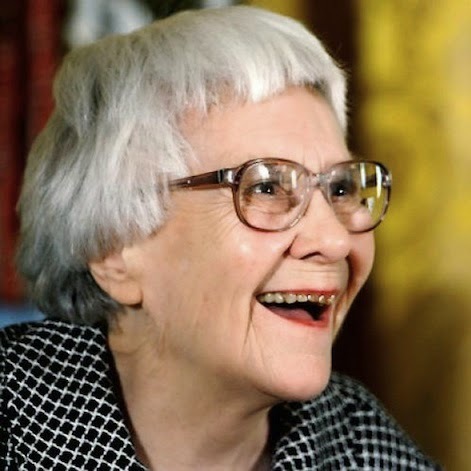 Harper Lee has been in the news lately regarding her opposition to Marja Mills' biography of her, recently published by Penguin. As we all know, Harper Lee only wrote one novel,
To Kill a Mocking Bird
; a modern classic, a book so excellent and popular that if any author is entitled to rest on her laurels and never write another word, that author is Harper Lee.
Harper Lee has been in the news lately regarding her opposition to Marja Mills' biography of her, recently published by Penguin. As we all know, Harper Lee only wrote one novel,
To Kill a Mocking Bird
; a modern classic, a book so excellent and popular that if any author is entitled to rest on her laurels and never write another word, that author is Harper Lee.But there was a terrible downside to the fame, plaudits and riches the novel (and film version with Gregory Peck) brought her. How she must have been plagued by crass well-meaning enquires as to what she was writing now, and why didn't she write another book, and hey, this is a good idea, why not write a sequel about what Scout did next? No wonder she spent the next fifty years as a recluse, refusing even to mention The Book.
Kill Zone had a recent post quoting J. T. Ellison: "It's the whole getting started thing for me. I forget how to write a book. The first ten thousand words are like digging fossils from rocks." I agree - I don't even want to talk about the WIP until it's at least two thirds finished.
One of my favourite quotes is from Lynne Truss:
People are only being nice, when they ask. To the enquirer, 'How's the novel?' is like saying 'How's your Mum?' - friendly, concerned, non-judgemental. But unfortunately this simple question, when filtered through the cornered-animal mentality of the weary novelist, is transformed into the sort of sneering insinuation that makes homicide justifiable.
'It was peculiar,' friends say to one another, when I pop out of the room. 'All I said was "How's the novel?" and look, she bit my hand.'
Published on July 26, 2014 04:03
July 17, 2014
I get to shoot guns for real

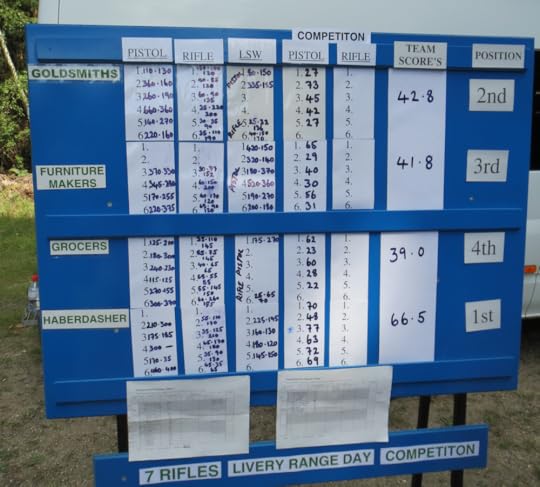
Guns appear in three of my novels so far, so when I was offered a place on the Goldsmiths' Company team on the 7 Rifles Livery Range Day I leapt at the opportunity to fire pistols and rifles with live ammunition. I knew I wouldn't be much of an asset to the team, never having fired a gun - but then most of the other liverymen had little or no experience either.
The event took place at Sandhurst. It's huge - roads run between various buildings and ranges, set in beautiful woodland with flitting butterflies and pine cones underfoot. All the soldiers were charming and helpful and seriously fit. On the range we wore ear defenders, protective glasses, helmets and body armour, presumably in case one of us turned out to be a really, really bad shot and randomly hit a fellow liveryman.
Glocks are heavier and larger than the die cast toy gun I sprayed black for the cover of Wolf by the Ears , and with a much heftier kick when fired than I'd imagined. The rounds are beautiful, like jewellery, and so are the empty cartridge cases, shiny brass glittering in the grass. No wonder it occurred to my grandfather to make a bell from cartridges during WW1, which I still have.
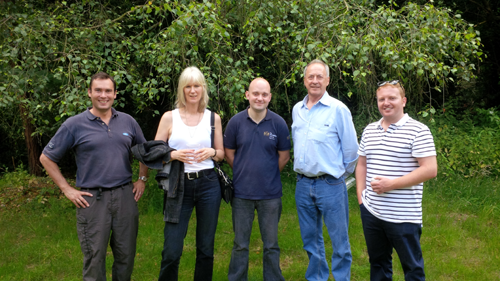 It is trickier to hit a target than you might think; the hardest part is holding the weapon steady while you line up the sights or cross hairs and squeeze the trigger. Did you know rifle sights are adjusted to suit the individual, so a sniper will be less accurate if not using his own weapon? I did my best shots with a rifle, lying prone, all five holes within a few centimetres of a target the size of a postage stamp (admittedly from close range). I regret not taking a photo before the nice soldier teaching me pasted paper over the holes ready for my next attempt while kneeling.
It is trickier to hit a target than you might think; the hardest part is holding the weapon steady while you line up the sights or cross hairs and squeeze the trigger. Did you know rifle sights are adjusted to suit the individual, so a sniper will be less accurate if not using his own weapon? I did my best shots with a rifle, lying prone, all five holes within a few centimetres of a target the size of a postage stamp (admittedly from close range). I regret not taking a photo before the nice soldier teaching me pasted paper over the holes ready for my next attempt while kneeling. My team came second, making us terribly proud of ourselves.
Published on July 17, 2014 09:23
July 12, 2014
Print edition of Wolf by the Ears
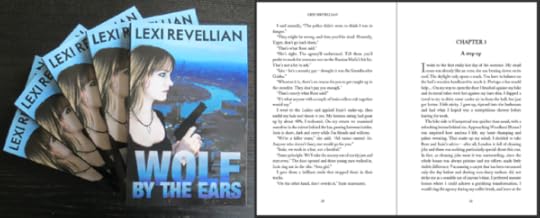
I've got the first copies of Wolf the paperback, and I'm rather proud. For the first time, I've mastered the gutter (woop woop) and so it's the best print version I've done. I've improved so much since doing Remix, I've now redone that book too, with drop caps, chapter headings, page headers and proper italics, not italics done in Word (this has been niggling me. I'm a jeweller, and jewellers are manic over detail). The new version of Remix should be available in a few weeks, and at a cheaper price.
Wolf by the Ears , print version, 274 pages, can be yours for £6.99.
Published on July 12, 2014 05:27
July 3, 2014
The trouble with time...
...well, there are several problems with it really.
We aren't given enough of it, and as Basil Fawlty pointed out, this is it, you don't get another go.
It only works one way, so you can't nip back in time and warn yourself not to buy a pension with Equitable Life* but invest the money in a cheap-at-the-time flat in Hackney instead.
And my current grouse - if you are working on one thing, by definition you are not working on something else. As a single mother running a small business, whatever I was doing, I felt I should be doing something else. And that hasn't changed. There always seems to be a bit too much work, and I never quite get to the bottom of my list. So when I'm at the workshop I'm fretting that I'm not getting on with my current project redecorating my flat. While wielding sander and filler, I think I should be writing. While writing, it suddenly occurs to me I haven't done a blog post for ages...
As a single mother running a small business, whatever I was doing, I felt I should be doing something else. And that hasn't changed. There always seems to be a bit too much work, and I never quite get to the bottom of my list. So when I'm at the workshop I'm fretting that I'm not getting on with my current project redecorating my flat. While wielding sander and filler, I think I should be writing. While writing, it suddenly occurs to me I haven't done a blog post for ages...
Maybe I'm lacking in time management skills, though I'd prefer to think I'm attempting too much. What about you?
*This is not written from experience. Luckily I couldn't afford to give Equitable Life more than a trifle - or for that matter buy a spare flat.
We aren't given enough of it, and as Basil Fawlty pointed out, this is it, you don't get another go.
It only works one way, so you can't nip back in time and warn yourself not to buy a pension with Equitable Life* but invest the money in a cheap-at-the-time flat in Hackney instead.
And my current grouse - if you are working on one thing, by definition you are not working on something else.
 As a single mother running a small business, whatever I was doing, I felt I should be doing something else. And that hasn't changed. There always seems to be a bit too much work, and I never quite get to the bottom of my list. So when I'm at the workshop I'm fretting that I'm not getting on with my current project redecorating my flat. While wielding sander and filler, I think I should be writing. While writing, it suddenly occurs to me I haven't done a blog post for ages...
As a single mother running a small business, whatever I was doing, I felt I should be doing something else. And that hasn't changed. There always seems to be a bit too much work, and I never quite get to the bottom of my list. So when I'm at the workshop I'm fretting that I'm not getting on with my current project redecorating my flat. While wielding sander and filler, I think I should be writing. While writing, it suddenly occurs to me I haven't done a blog post for ages...Maybe I'm lacking in time management skills, though I'd prefer to think I'm attempting too much. What about you?
*This is not written from experience. Luckily I couldn't afford to give Equitable Life more than a trifle - or for that matter buy a spare flat.
Published on July 03, 2014 02:35
June 11, 2014
London cabs and why they are like Big Publishing
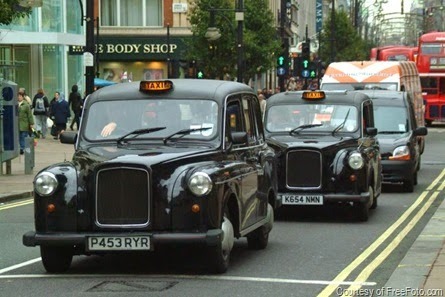 Today London's black cab drivers headed for Trafalgar Square in protest at the threat to their livelihood from Uber. You can summon an Uber cab from your smartphone, and it will collect you and take you to your destination for less than a black cab would cost.
Today London's black cab drivers headed for Trafalgar Square in protest at the threat to their livelihood from Uber. You can summon an Uber cab from your smartphone, and it will collect you and take you to your destination for less than a black cab would cost. Though the official objection is to the unlicensed use of meter apps, that's not really the issue. Cabbies who have spent years acquiring The Knowledge and hold the whole network of London streets in their heads resent this newcomer using apps and satnavs muscling in on their territory and undercutting their prices.
It seems to me that the issue has a lot in common with Big Publishing's problems with Amazon. Like the Big Five, London's cabbies have enjoyed a virtual monopoly, and their prices have risen to the point where I don't take cabs any more - I can't afford the fares. Now Uber offers a digital alternative - cheaper and more convenient - no more waiting to hail a cab, just tap into your phone.
Cabbies want Uber to go away so things can go on the way they always have. But the new technology won't go away. Unless the cabbies can persuade the government to block Uber, they will have to adapt in order to survive, even if that means being more competitive on price, accepting internet bookings and abandoning The Knowledge.
The internet has radically changed the way people do business. If you don't want to change, then you will find an outsider changing things for you. Publishing's outsider was Jeff Bezos.
Published on June 11, 2014 13:33
Replica's screenplay
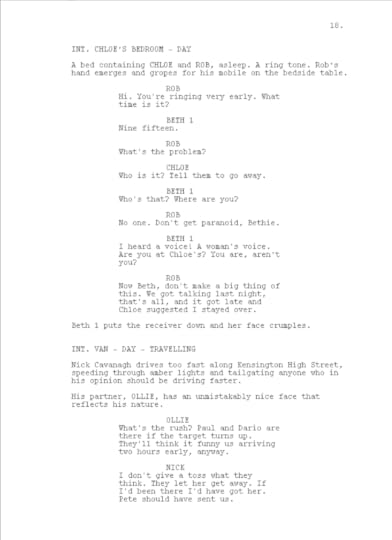 My brief foray into screenplay writing is over. (No, don't worry about me, I'll be fine, honestly.)
My brief foray into screenplay writing is over. (No, don't worry about me, I'll be fine, honestly.)Many readers have commented that Replica would make a good film. So eventually I decided to write the screenplay. It was really hard reducing the book to 114 pages - so much had to go, including a character or two - but I finished a few months ago, and d'you know, I thought it was quite good. I was aware I was probably wrong - noobs are generally filled with false confidence regarding their first efforts. I knew I'd formatted it right, as formatting is easy if you just take pains enough.
A professional scriptwriter, Oli Jeffery, had kindly offered to read it for me. While waiting for his opinion, I put it in to the BBC's Scriptroom, which considers film scripts once a year. I'd told Oli not to pull his punches, and in a long and thoughtful critique he told me my screenplay, though the formatting and descriptions were good, was structurally out of whack and the pacing was off. Among other flaws. Quite a lot of them.
I'm sure he's right. Now I could spend more time learning to write scripts and I think if I did, I'd get there in the end. The process must be similar to learning to write a novel. But it occurred to me, once I'd written a brilliant screenplay it would need to pass the gatekeepers in order to be made into a film, and I just can't face that. Been there, got the tee shirt, didn't like it. My time would be better spent writing the next novel.
And Scriptroom 5? The BBC emailed me: We received over 1300 TV & Film Drama scripts, and our team of readers have been working intensively to sift through all submissions.
After reading the first 10 pages your script was put forward to the next sift where the first 20-30 pages of scripts were then read by another reader – which was the case with 13% of submissions we received. Unfortunately your script did not progress beyond this stage, so will not be considered further and will not receive any other feedback.
I'm quite pleased my script was in the top 13% of submissions. (Mark you, the formatting was really good.)
Published on June 11, 2014 07:36
June 1, 2014
Indie to trad and happy?
 Joe Konrath said something on his blog a few weeks ago which has been kicking around at the back of my mind ever since:
Joe Konrath said something on his blog a few weeks ago which has been kicking around at the back of my mind ever since:"Publishers keep looking at indie success as a slush pile where they can scoop up the best. They'll keep doing that until indies learn better. But very few indies who sign with a legacy publisher and hate the experience will speak publicly about it, because their books are being held hostage and playing nice with their new corporate masters is essential if they want to continue to make money.
So you won't see many authors bashing their publishers. But how many who signed indie deals sing their publishers' praises? Isn't it odd we don't see a lot of that?"
Of course, when a successful indie is wooed and won by one of the Big Five*, he is initially thrilled. The advance will be substantial - it has to be, to match the money he's been making on his own - and it's always a boost to the ego to be pursued. Probably he's secretly gratified to think he'll finally fulfil his fledgling writer aspirations; piles of hardbacks in shop windows, book signings, 'proper' reviews in the media, even 'validation' by the gatekeepers. It'll save him from doing his own (or commissioning) editing, covers, formatting and marketing. For a few weeks, he'll be blogging and tweeting and telling everyone he knows.
Then what? I've poked about the internet a bit, and in most cases, the author goes curiously quiet. Blog posts become muted, mostly just about release dates and cover art. Have I picked up the wrong impression, or do most ex-indie authors conclude they've signed a pact with the devil?
*I'm not including Amazon publishing here, which offers much more to an author than trad pub does. I'd sign with Amazon with enthusiasm. Nor do I include print-only deals like Hugh Howey's.
Published on June 01, 2014 02:33
May 24, 2014
ABNA: Ice Diaries' Publishers Weekly review
 As an ABNA quarter finalist, my novel
Ice Diaries
was entitled to a review from Publishers Weekly. The reviews are brief, mostly plot summary, and not necessarily flattering, though there is the odd truly enthusiastic one that makes you think the novel is a dead cert for the semi-finals.
As an ABNA quarter finalist, my novel
Ice Diaries
was entitled to a review from Publishers Weekly. The reviews are brief, mostly plot summary, and not necessarily flattering, though there is the odd truly enthusiastic one that makes you think the novel is a dead cert for the semi-finals. For those who are interested, some entrants have posted their reviews on US Amazon forums. Here's mine, not a rave but not bad either:
ABNA Publishers Weekly Review of Ice Diaries:
In this post-apocalyptic novel set in the year 2018, London and most of the world's northern climes have been buried beneath hundreds of feet of snow. Survivors of the SIRCS pandemic and climate change band together for safety. Main character Tori lives in a small community that works together democratically to raid local stores for supplies. She is happy with her small band of friends until a mysterious stranger appears in their midst. The once peaceful, autonomous community begins to crumble as first Dominic Morgan, a former mixed martial arts fighter recovering from a knife wound, questions their methods of survival, and then more fighters, hunting for Morgan, arrive. Tension mounts and Tori begins to seriously consider her long-term survival and whether her path might be linked with Morgan's future.
The author creates realistic and varied characters that blend convincingly into this post-apocalyptic world, showcasing both Tori and Morgan's emotional growth as the story progresses. The snowy London landscape feels well thought out, creating a setting that evokes a palpable layer of danger throughout the novel, giving readers a distinct and immediate reason to root for Tori's escape to warmer climes. Engaging and solidly written, readers will be hoping for more of Tori in the future.
Published on May 24, 2014 03:45



